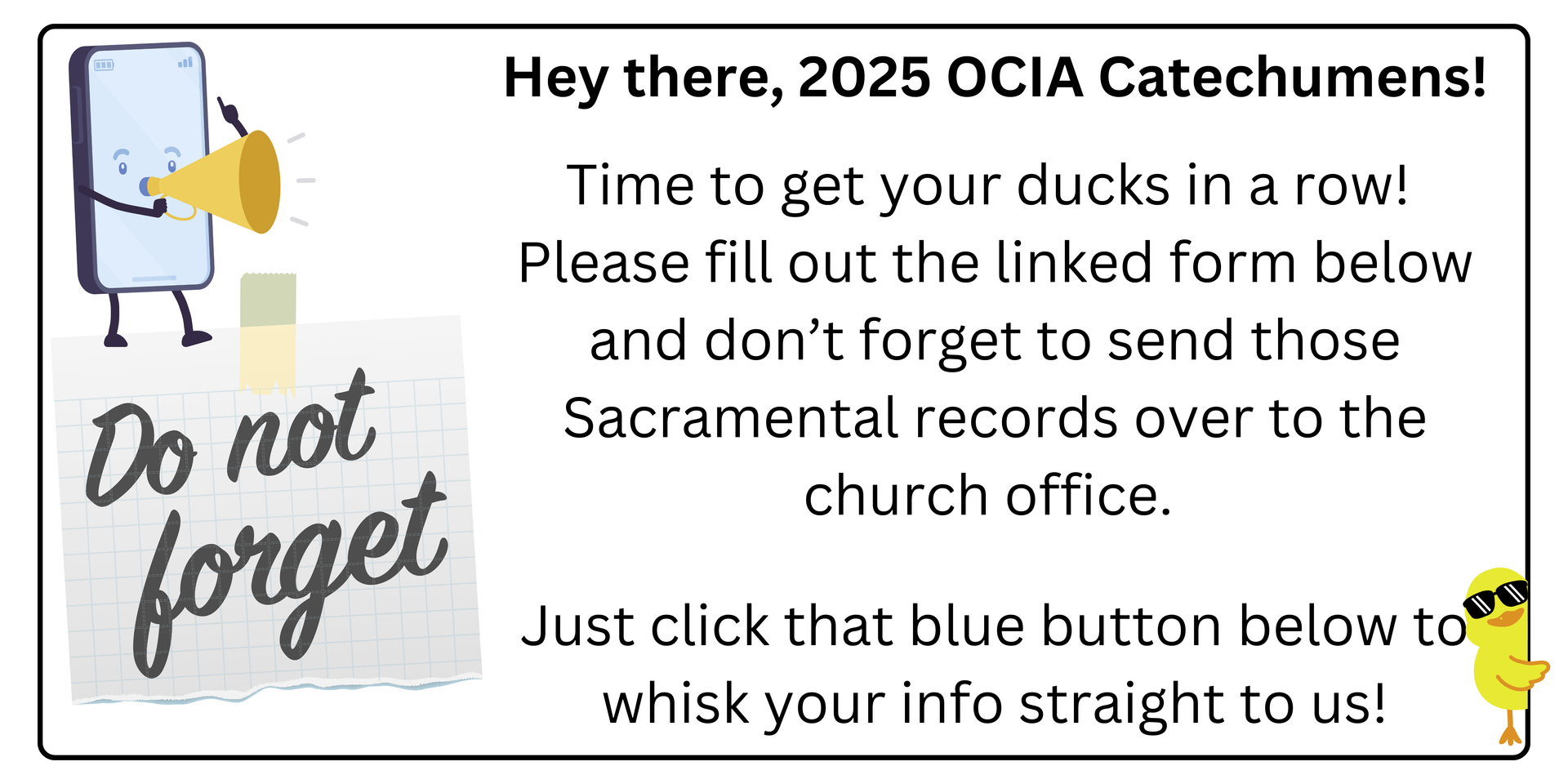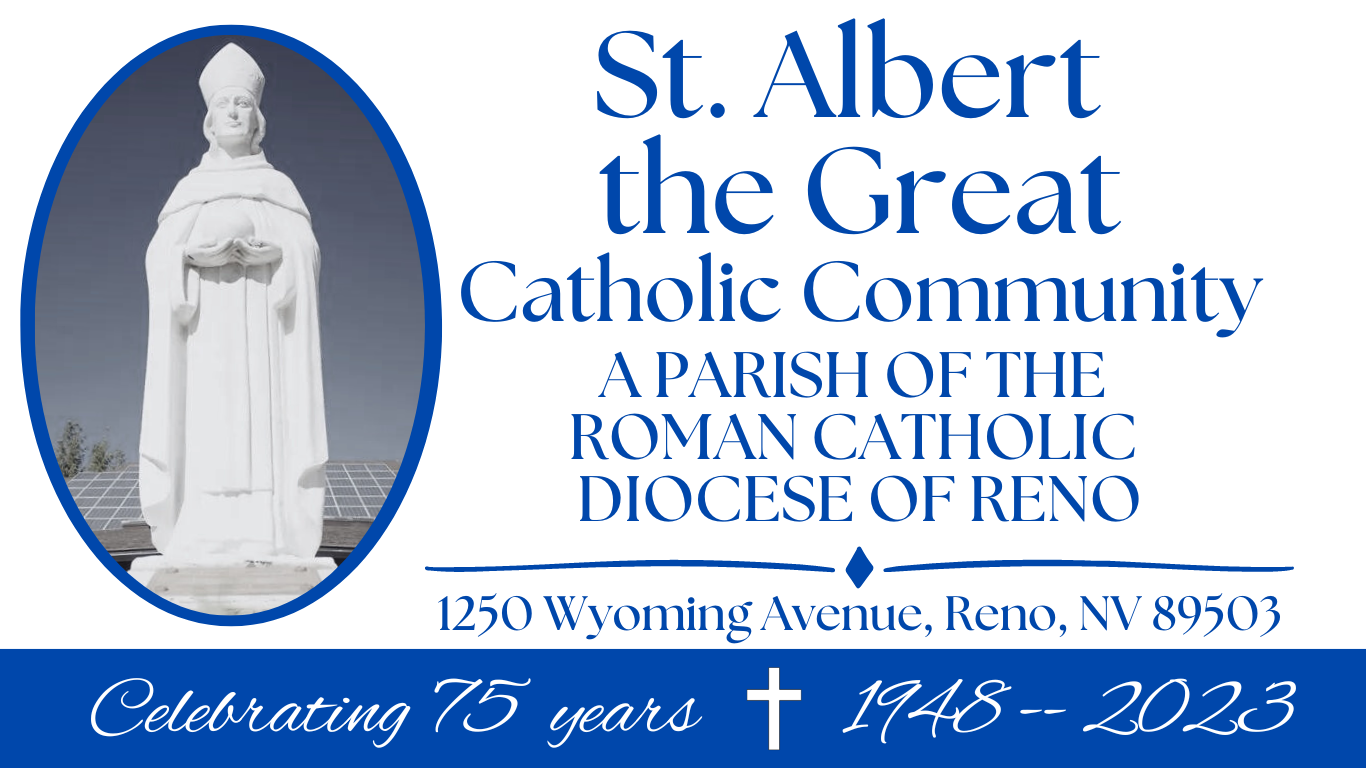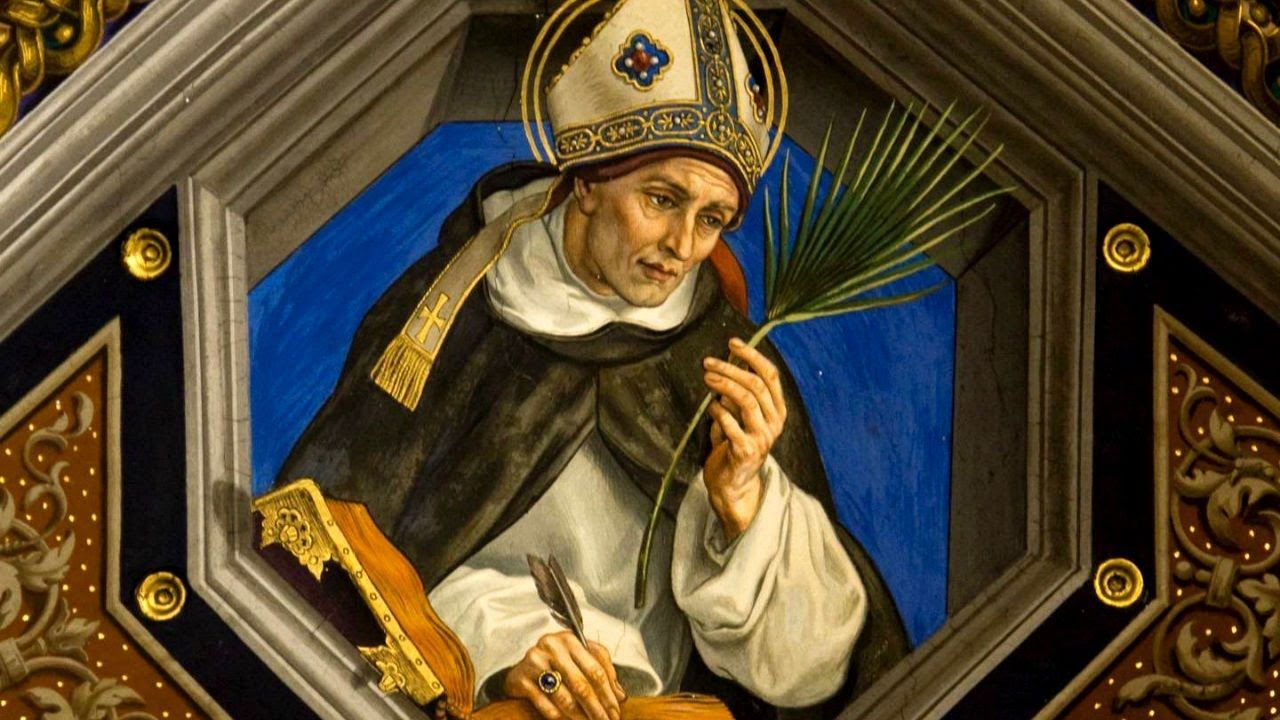What is OCIA?
Formerly called "Rite of Christian Initiation of Adults (RCIA)"
The Order of Christian Initiation for Adults, or OCIA, is a communal process for formal initiation of new members into the Catholic Church. This process is a return to the formation of the earliest members of the Church in the first and second centuries.
The U.S. Conference of Catholic Bishops describes the Rite of Christian Initiation for Adults as a process in which participants "undergo…conversion as they study the Gospel, profess faith in Jesus and the Catholic Church, and receive the sacraments…The OCIA process follows the ancient practice of the Church and was restored by the Second Vatican Council as the normal way adults prepare for baptism."
Likewise, the language used in the OCIA process is that of the early Church formation programs. Catechumens are those people who are seeking full initiation into the Catholic Church through all of the Sacraments of Initiation – Baptism, Eucharist and Confirmation. Candidates are people who have been baptized in a Christian tradition but are seeking initiation into the Catholic Church through Eucharist and Confirmation.
All are Welcome!
What Is The OCIA?
OCIA (Order of Christian Initiation of Adults), formerly called "Rite of Christian Initiation of Adults (RCIA)," is the process through which one becomes a full member of the Roman Catholic Church. Full membership in the Catholic Church involves a whole formation process, which includes the reception of the Sacraments of Initiation: Baptism, Confirmation, and the Most Holy Eucharist. While coming to know Jesus and His invitation to become a disciple, the OCIA process involves the journey of faith and conversion. A person is introduced to the beliefs, life, liturgy, and apostolic work of the Catholic Church.
Who Is OCIA For?
OCIA is designed primarily for those desiring Baptism – the beginning of the life of a Christian. For those who have already been baptized Christians, we will evaluate their needs and appropriately involve them in our programming. For those that are already baptized, please refer to the section titled “Ministry to the Baptized.”
The Five Main Stages of OCIA.
The Period of Inquiry (Length of Time Specific to the Individual
This is the earliest phase in the process; it is also known as the Period of Inquiry. Catechumens and Candidates acknowledge that Christ is calling them into the Church through the movement of the Holy Spirit. This is a time for seeking and reflection. The Period of Inquiry is a time to become acquainted with the Catholic Church and to hear the good news of salvation from Jesus Christ, our Savior. It is a time to look within one’s life story and see connections to our needs for the Gospel. This reflective process becomes a continuing, ongoing method during the entire journey. During this reflective process, one should ask questions, discern, and learn about a life of faith in Christ and the Catholic Church.
During this period, some may decide that this is not the right time for them to consider membership in the Catholic Church. It is entirely up to the individual’s free will, and no pressure will be exerted against this decision.
The Period of Catechumenate (4 months)
The Period of Catechumenate embodies the first stages of commitment leading to full membership. To enter into this phase, one must already have come to faith in Jesus Christ as one’s Lord and Savior and sincerely desire to become members of the Catholic Church. The catechumens now gather with the Catholic community on Sundays for Liturgy of the Word. They then are dismissed after the homily for Breaking Open the Word, where one will encounter Scripture in one’s own life and discuss it amongst one’s group.
During this period, the initial conversion is deepened and appropriated more deeply into the lives of the catechumens.
The Period of Purification & Illumination (6 weeks)
The Period of Purification & Illumination corresponds to the Catholic Church’s time as “Lent,” which is the six weeks of preparation before Easter. This period becomes a prayerful time for catechumens, who are now known as the “Elect,” as they prepare for the moment they enter into Full Communion with the Catholic Church in the Sacraments of Initiation. This period is begun with the Rite of Election and Call to Continuing Conversion, which is celebrated at the Cathedral of St. Mary of the Immaculate Conception under the headship of the Bishop. By this rite, they are accepted as candidates for the Bishop's sacraments, representing that this decision is not theirs alone.
Throughout Lent, special prayers are offered at Sunday Masses for the elect and candidates – these are called “scrutinies.” These prayers are for strengthening grace and virtue, purification from all past evil, and any bonds that hinder them from experiencing God’s love. Throughout this period, the elect is invited to join with the whole Church in a deeper practice of charity works and the practice of fasting.
During this period, Breaking Open the Word continues, and Lent’s readings were chosen with the themes of continuing conversion in mind. Toward the end of the period, the Church continues the custom of “handing over” to the Elect the Creed (the summary of our faith) and the Lord’s Prayer (which represents its practice of continuing prayer after the command of Jesus, who taught us to pray).
The Celebration of the Sacraments of Initiation (One night)
The Sacraments of Initiation are celebrated at the Easter Vigil on Holy Saturday, an extended night watch of prayer, singing, and hearing God’s Word in anticipation of Christ’s resurrection at Easter.
Through the waters of baptism, a person passes into the new life of grace and becomes a member of the Body of Christ. By anointing the person with the Sacred Chrism, one is sealed by the power of the Holy Spirit and is then called to full participation at the Eucharistic Table, which marks full membership in the Catholic Church.
The Period of Mystagogy (50 days)
The Period of Mystagogy lasts from Easter Sunday until the completion of the Easter Season at Pentecost. At the end of mystagogy, one reaches the end of the Rites of Christian Initiation. Those who have just shared in the Sacraments of Initiation are now called “neophytes,” and during this period of Easter joy, they reflect on what they have just gone through and look to the future as to how they can now share in the mission of Christ who came to bring salvation and life to the whole world. This time period reminds the whole church that life in Christ constantly calls us to grow and look for new ways to live the life of grace personally and together. This final period reminds the neophytes that the initiation process is just that: initiation, not graduation, which means a commitment to a lifelong journey of conversion.
OCIA is a Journey
Ministry To The Baptized
For those who have already been baptized into another Christian faith, St. Albert's welcomes you to discern the Catholic Faith. Respectful of and tailored to one’s particular needs, this process will help lead an already baptized person into Full Communion with the Catholic Church through the sacraments of Confirmation and the Most Holy Eucharist. To start the journey, an initial interview is essential to discern what might be appropriate for each individual. To schedule that interview, please contact Karen McClenahan, OCIA Director, whose contact information can be found at the bottom of this page.
How Long Does OCIA Take?
OCIA kicks off in September and goes for 50 joyful days after Easter every year! We meet up on Wednesdays from 7:00 to 8:30 PM in the Gathering Room of the Rectory. Oh, and just a heads-up: we take a summer break to soak up the sun!
Those who have not yet been baptized will be fully initiated into the Catholic Church at the Easter Vigil after participating in the OCIA process for at least one year.
Those who have been baptized into a non-Catholic Christian tradition will be received into Full Communion with the Catholic Church after completing their formation, respective to their particular needs. As such, this timeframe varies depending on the person.
What About Bringing A Friend Or A “Sponsor”?
Each participant must have a sponsor to walk with him or her through each step of the process. You may choose your sponsor with our approval, or we will provide you with a community sponsor. The sponsor must be at least 16 years of age, a confirmed, practicing Catholic, and not your parent.
Tips to Help You as you begin this Journey
St. Albert’s is here to help you grow in your relationship with Jesus Christ, and the whole OCIA process is about growing in union with God. To start the process, you should:
(1) begin learning prayers and building a habit of daily prayer;
(2) be open to the fullness of Catholic teaching and life; and
(3) begin to live according to the fullness of Catholic life even now (e.g., regarding doctrine and living the moral life).


Contact Information





